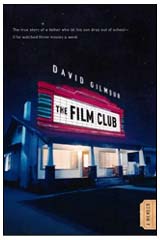Books |
The Film Club
David Gilmour
By
Published: Jan 01, 2008
Category:
Memoir
His grades started dropping in the ninth grade. In the tenth, they toppled. He switched to a private school. No difference. Jesse Gilmour just didn’t give a damn.
His father — David Gilmour, a well-known Canadian novelist — was unhinged. At this rate, Jesse wouldn’t be going to college. At this rate, Jesse would be flipping burgers at minimum wage — if he didn’t completely fall apart.
Dad had to intervene. And he did. He had been a movie critic for the Canadian Broadcasting Corporation. His son liked movies. On that frail connection, he proposed that Jesse drop out of school and watch three movies a week. Dad’s choice. Just the two of them.
The film club began with Truffaut’s “400 Blows”. European. Arty. Certain to bore the kid. But important because Truffaut was “a high school dropout, a draft dodger, a small-time thief.” They watch. They talk. You’re interested.
Then Rebecca Ng enters the story. She’s mature, mysterious, unspeakably hot. Jesse’s smitten. David’s worried. Seeing Rebecca and Jesse together was “like watching him get into a very expensive car. I could smell the new leather from here.”
Girls and movies make for a more complicated story. Now add another element: David’s writing career. Suddenly it’s going about as well as Jesse’s schooling. It looks as if there are two dropouts in the Gilmour residence.
But David perseveres with the film club. In the course of the screenings, he serves up terrific tidbits. Did you know Alfred Hitchcock built a second set of stairs so Ingrid Bergman’s long walk at the end of “Notorious” is doubly tense? That Stephen King didn’t like the film of “The Shining” and had no affection at all for its director, Stanley Kubrick? That director William Friedkin got a great performance by a priest in “The Exorcist” by asking the guy if he trusted him — and then slapping him in the face?
Yes, you learn lots of cool trivia from “The Film Club”, but that’s not the big takeaway. This easily digested memoir is about something much bigger than film — it’s about people, and how we see them, and how we treat them.
There are, if you think that way, “good kids” and “bad kids”. And there are “responsible parents” and “permissive parents”. You can put those grids over relationships and make some easy, smug judgments. And I’ll bet, if you’re that sort of reader, even this brief description of “The Film Club” is enough to lead you to conclude that Jesse’s a bit of a loser and Dad’s a bit of a flake.
If you’re that kind of reader — what am I saying? I’m that kind of reader! I judge like mad! And of course I feel superior to this father-and-son team. Why not: I loved school. And as a stepfather and now a father, the kids who have lived with me have also loved to learn — even in school.
So if you’re that kind of reader — if, like me, you think of yourself as a rebel, but you don’t color too far outside the lines — this is a very subversive memoir. Three years in two lives. Father and son really getting to know one another. Boundaries broken. Generalizations shattered — David and Jesse’s first, but yours most of all.
Don’t think this is a small book just because it’s short (217 pages) and intimate. David Gilmour took a chance. A big chance — few parents would tell their teenaged kid he/she doesn’t have to go to school. To ask “Did Jesse’s life work out?” is to reduce this complex story to a Hollywood movie plot. It did and it didn’t. It’s real life, not a movie.
On the other hand, “The Film Club” does have a pretty great ending.
To buy “The Film Club” from Amazon.com, click here.


